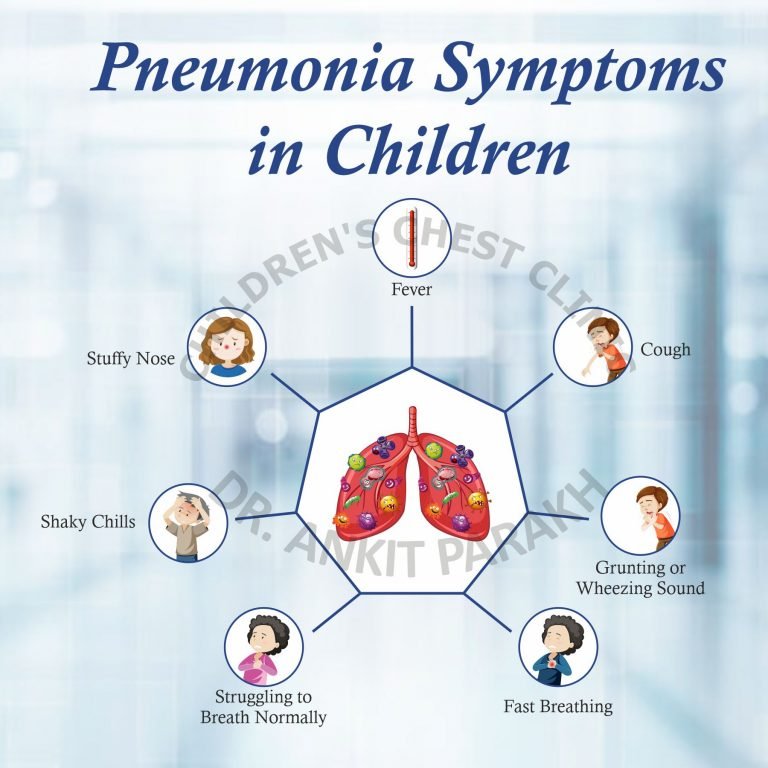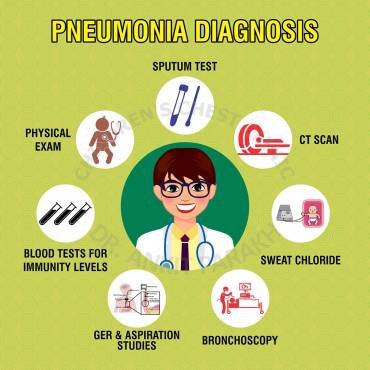
Pneumonia in Children: Understanding Persistent and Recurrent Cases
What is Persistent Pneumonia?
Persistent pneumonia refers to cases where symptoms of pneumonia, such as fever, cough, and difficulty breathing, do not resolve or improve after appropriate treatment within the expected timeframe. This could be due to incomplete antibiotic coverage, antibiotic resistance, or underlying health conditions that compromise the child’s immune response.
What is Recurrent Pneumonia?
Recurrent pneumonia is diagnosed when a child experiences two or more episodes of pneumonia in a single year or three or more episodes ever, with radiographic clearance between episodes. Recurrent pneumonia often indicates an underlying issue, such as structural lung abnormalities, immune deficiencies, or chronic diseases like asthma.
Causes of Persistent and Recurrent Pneumonia
- Inadequate or Improper Treatment: Persistent symptoms may occur if the initial treatment doesn’t target the specific pathogen causing the pneumonia.
- Tuberculosis: Tuberculosis is still endemic in India and is one of the common cause of persistent pneumonia
- Underlying Health Issues: Conditions such as cystic fibrosis, bronchiectasis, recurrent aspiration, congenital heart disease, gastroesophageal reflux disease, or immunodeficiencies can predispose children to recurrent infections.
- Foreign Body Aspiration: A foreign object lodged in the airway can lead to repeated infections and inflammation.
Diagnosis and Treatment
For children with persistent or recurrent pneumonia, a thorough diagnostic evaluation is crucial. This may include:
- Chest X-rays: To assess lung involvement and identify complications.
- Blood Tests: To determine the cause and severity of the infection
- CT Scan Chest: helps in details evaluation of the lungs
- Bronchoscopy: To check for airway blockages or foreign bodies.
- Immunological Testing: To evaluate for immune deficiencies.
- Sweat Chloride Analysis
- Studies for Evaluation for Gastroesophageal Reflux
- Swallow study for evaluation of Aspiration

Treatment often involves targeted antibiotics, antiviral medications, or antifungal drugs based on the specific pathogen. In recurrent cases, addressing the underlying cause, such as managing asthma or surgically removing airway obstructions, is essential.
When to Consult a Pediatric Pulmonologist
Parents should seek specialized care if their child experiences:
- Persistent symptoms despite treatment.
- Two or more episodes of pneumonia within a year.
- Difficulty breathing or unusual fatigue.
- Unexplained weight loss or growth failure.
Early intervention and expert care can significantly improve outcomes for children with pneumonia.
Related Video
Frequently Asked Questions (FAQs)
1. What causes pneumonia in children?
Pneumonia in children is most commonly caused by bacterial, viral infections, tuberculosis and atypical bacteria.
2. What are the common causes of persistent pneumonia in children?
Most common cause of Persistent pneumonia in India is tuberculosis. Other common causes are retained foreign body and congenital anomalies.
3. What are the common causes of recurrent pneumonia in children?
Most common cause of recurrent pneumonia in children are bronchiectasis, cystic fibrosis and recurrent aspirations.
4. When does pneumonia need to be investigated further?
Repeated episodes of pneumonia or a single episode not clearing up raises a red flag that an underlying disease process may be present. Hence all children with recurrent or persistent pneumonia would need further evaluation.
5. What role does a pediatric pulmonologist play in managing pneumonia?
A pediatric pulmonologist specializes in respiratory issues and can provide advanced care for children with persistent or recurrent pneumonia by addressing underlying causes and optimizing treatment plans.



